Modèles opérationnels
Le rapport « La situation mondiale des transferts monétaires » du CALP Network identifie plusieurs types de modèles opérationnels, dont les consortiums et les alliances, les mécanismes de distribution des transferts partagés, un modèle de distribution des transferts monétaires articulé autour d’une seule organisation et l’intégration de systèmes.
« La structure générale au sein de laquelle les organisations travaillent conjointement […] pour distribuer les transferts monétaires […] lors d’interventions et d’activités d’analyse, et de la conception et de la mise en œuvre de programmes. »
Notre définition d’un modèle opérationel
Accroître l’échelle des transferts monétaires permet de transformer la manière dont l’aide humanitaire est distribuée. Cette décision a des conséquences sur les rôles des organisations dans le cadre de plusieurs modèles opérationnels, et sur la capacité des modèles à établir un lien avec les systèmes de protection sociale. Un changement d’échelle aura également un impact sur les partenariats avec des fournisseurs de technologies et de services financiers et sur la manière dont différents modèles interagissent avec d’autres formes d’assistance.
Priorités actuelles
Depuis fin 2016, le CALP Network assure la coordination d’un programme d’apprentissage visant à répondre aux questions suivantes :
- Quels sont les modèles opérationnels disponibles pour les organisations mettant en œuvre les transferts monétaires ?
- Comment différents modèles ont-ils amélioré l’efficience, l’efficacité et la transparence des transferts monétaires dans divers contextes ?
- Quels sont les modèles opérationnels les plus appropriés dans chaque contexte ?
Nous continuerons de compiler et diffuser notre base de données probantes sur les modèles opérationnels.
Nous sommes également partenaire du consortium Cash Monitoring, Evaluation, Accountability, and Learning Organizational Network (CAMEALEON), piloté par le Conseil norvégien pour les réfugié·es, qui est responsable du suivi et de l’évaluation indépendantes du programme d’assistance monétaire à usages multiples du PAM au Liban. À ce titre, nous menons des recherches et des analyses concernant l’optimisation des ressources et la redevabilité au sein du modèle opérationnel.
Contenu présenté

Operational Models: Accountability to affected people
Webinar

MEAL in Emerging Operational Models
Webinar

CTP Operational Models Analytical Framework
Guidelines and Tools
The State of the World’s Cash Report launched by the CALP Network in February 2018 highlights trends in the uptake of various operational models for the delivery of cash at scale in humanitarian response. Current decision making on the choice between these various operational models is highly influenced by context, and by the policies and approaches of donor agencies. Decision making on...
Thematic lead
Contenu récent

Mercy Corps Tipsheet: COVID-19 and CVA
Guidelines and Tools
This tipsheet serves as guidance to help field teams think through different ways to mitigate the spread and impact of Covid-19 through ongoing cash and voucher assistance (CVA), inform the adaption of CVA programming in the context of Covid-19, and promote sensitivity to changing market dynamics and...

Plan International: COVID-19 Adaptations to Cash and Voucher Assistance (CVA) Interventions
Guidelines and Tools
The aim of this technical guidance is to support the team in designing and implementing Cash & Voucher Assistance (CVA) programmes in both development and humanitarian settings to adapt interventions in response to the Covid19 outbreak, in order to:
1. Support adequate prevention and response to Covid19,...

Cash Week 2019: How cash is driving change across the system
Blog Post
Cash Week 2019 aimed to provide a space to reflect, learn, and look ahead, to ensure quality in our use of CVA at scale. The CALP team reflects on the key takeaways from the events that took place around the world, and what they mean for actors within and beyond the humanitarian sector.

Mapping of CWGs, CCS and CCD Networks in Latin America and the Caribbean
Guidelines and Tools
This map was developed with information captured at The Cash Learning Partnership workshop that took place in Panama City, Panama on 21 November 2019, the activity had the aim to map cash and voucher assistance coordination structures in the region.
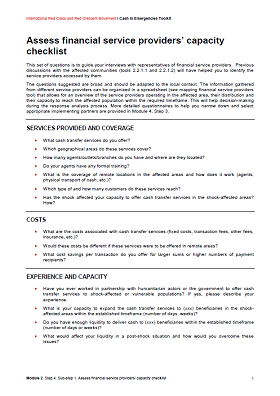
International Red Cross and Red Crescent Movement Cash Feasibility and Delivery Mechanism Tools
Guidelines and Tools
A series of tools to aid assessment of feasibility and potential delivery mechanisms for delivering aid via Cash Transfer Programming (CTP)

Cash Week 2019: Collaborating for quality, today and tomorrow
Event
Cash Week 2019 provided a space to reflect, learn, and look ahead, to ensure quality in our use of cash and voucher assistance (CVA) at scale. An expanded agenda saw events taking place globally throughout November and December.

Operational Models: Accountability to affected people
Webinar

MEAL in Emerging Operational Models
Webinar
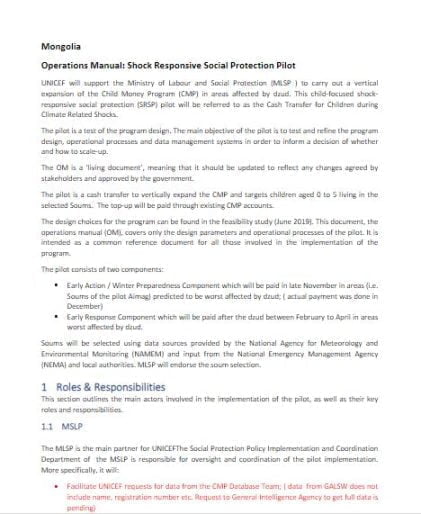
Operations Manual: Shock Responsive Social Protection Pilot
Guidelines and Tools
The pilot is a test of the program design. The main objective of the pilot is to test and refine the program design, operational processes and data management systems in order to inform a decision of whether and how to scale-up.
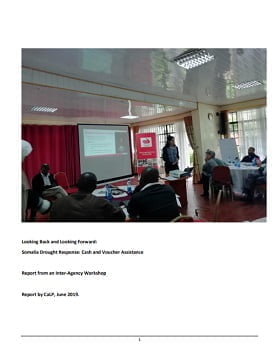
Looking Back and Looking Forward: Somalia Drought Response: Cash and Voucher Assistance
Case Study
This report summarizes the discussions that took place during a one-day learning event on 11th June 2019. The event brought together 27 people from national and international NGOs, the UN, and donors to discuss progress, reflect on cash and voucher (CVA) assistance in Somalia and identify priorities for...
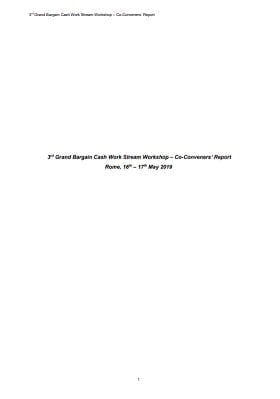
3rd Grand Bargain Cash Work Stream Workshop – Co-Conveners’ Report
Report
The third Grand Bargain (GB) Cash work stream Workshop was held at WFP Headquarters in Rome on 16th-17th May 2019, hosted by WFP and DFID. Over 85 participants attended the workshop, representing 60 donor and humanitarian organisations and multilateral agencies, and including representatives from the...

Analyse des dynamiques sociales et des pouvoirs des parties prenantes pour la mise en place de Transferts Monétaires à Usage Multiple (TMUM) pluriannuels au Nord Mali
Rapport
Six ONG internationales (Action contre la Faim, Danish Refugee Council, Handicap International, International Rescue Committee, Oxfam et Solidarités International) ont mis en place un programme de transferts monétaires à usage multiple au Mali ; la deuxième phase de cette intervention de filets...

Le ciblage dans les systèmes de protection sociale : étude comparative sur deux méthodes
Rapport
Les filets sociaux sont en train de devenir un instrument clé des politiques visant une réduction de la pauvreté en Afrique sub-saharienne et constituent un élément de base des systèmes de protection sociale qui incluent la protection sociale adaptative. Les systèmes de protection sociale visent à...

Consultation on Cash and Voucher Assistance to the Main Spanish NGOs Funded by Aecid – Executive Summary
Report
This executive report summarizes the results obtained from a study of the cash and voucher assistance (CVA) practices of eight Spanish NGOs in the field of humanitarian assistance. You can read the full report in Spanish here.

Cash for Shelter in Kenya – A Field Experience
Report
A study of a cash for shelter project in Kalobeyei that highlights how UNHCR uses cash assistance to help the refugees to transition to more durable solutions, in this case, integration with the host community. The project presents a paradigm shift from the traditional refugee camp planning process.
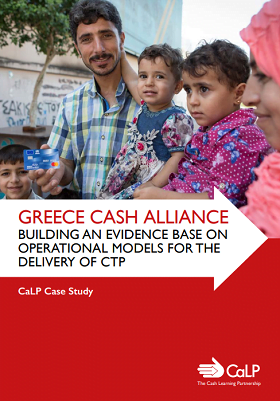
Greece Cash Alliance: Building an Evidence Base on Operational Models for the Delivery Of CTP
Report
The primary aim of this case study is to map out aspects of the Greece Cash Alliance (GCA) operational model influencing key drivers of quality (effectiveness, efficiency and accountability) in the delivery of multipurpose cash grants (MPGs). The GCA was launched in April 2017 with funding from ECHO, in...
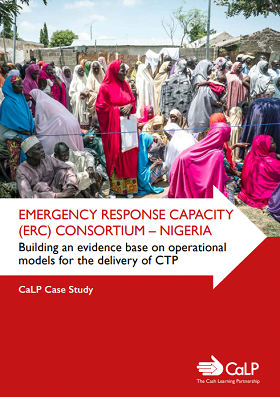
Emergency Response Capacity (ERC) Consortium – Nigeria: Building an evidence base on operational models for the delivery of CTP
Report
This case study aims to review and map out how aspects of the Enhanced Response Capacity (ERC) consortium model have influenced key drivers of quality (effectiveness, efficiency and accountability) in the consortium’s Nigeria pilot. Formed at the global level in 2015, the ERC Consortium is comprised of...
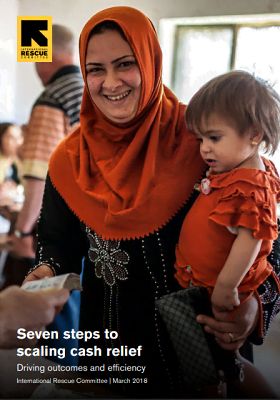
Seven Steps to Scaling Cash Relief: Driving Outcomes and Efficiency
Guidelines and Tools
As we approach the mid-point of our five-year strategy, this briefing explores the way in which the IRC has embraced cash relief programming and is seeking to drive efficiencies and maximise impact. It defines seven steps that the IRC has taken to scale cash relief. It goes on to argue that...

Cash and Markets Working Group Strategic Workshop Report – Libya
Report
On the 6th and 7th of February 2018, a two days meeting opened to the members of the CMWG, Sector Leads, World Bank, UNSMIL, OCHA and Donors was held in Tunis to review the achievements, gaps and challenges of cash programing and articulate the 2018 humanitarian Cash Strategy for Libya. Supported by a...

Review of Food for Peace Market-Based Emergency Food Assistance Programs: Democratic Republic of Congo Case Study Report
Report
The Democratic Republic of Congo (DRC) case illustrates the complexity and diversity of contexts within which program design and implementation occurs. It highlights the need for provincial-scale assessments, local market monitoring, and flexibility to pivot to different modalities depending on changing...



